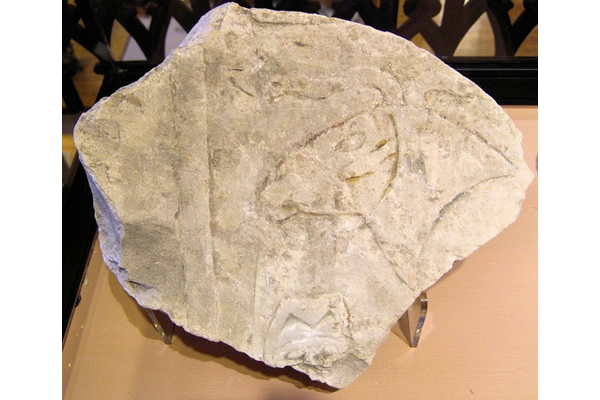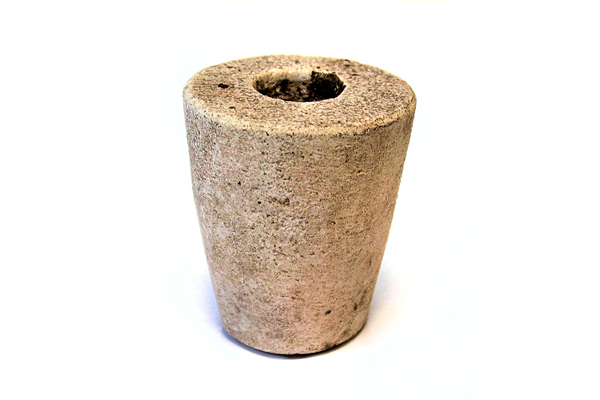Ancient Egypt
Egyptology was the key discipline in the development of archaeology and the modern understanding of ancient history. It remains central to a full understanding of the development of the ancient world.
The objects in the collection cover all periods of Ancient Egyptian history from the pre-dynastic Amratian culture of the Naqada period through the Old and New Kingdom dynasties to the Ptolemaic and Roman periods. The collection contains examples of objects such as pottery, shabtis, amulets, scarabs in addition to carvings, stela and other funerary equipment. There is a small collection of pre-dynastic pottery from el Amra.
The collection provides a good general selection of objects from many of the most important sites excavated by the Egypt Exploration Fund in the late nineteenth century. The sites include Abydos, Bubastis, Defenna, Deir el-Bahri, Dendera, Diospolis Parva, El Amra, Hawara, Herakleopolis Magna, Naukratis and Oxyrhynchus. The archaeologists involved in these archaeological digs were amongst the founding fathers of Egyptology and included Sir William Matthew Flinders Petrie (1853-1942) and Henri Édouard Naville (1844-1926).
The collection contains pieces of national and international significance such as the mummy cartonnage from Herakleopolis Magna and the temple stone from the Great Temple of Bast at Bubastis. The collections are of ongoing relevance to researchers since they come from published archaeological excavations which means they have a broader context of discussion.

Mummy Cartonnage
Mummy cartonnage of a woman named An-Ankh-Rat. Libyan period. Excavated at the Necropolis of Herakleopolis Magna by Édouard Naville (1844-1926). 1987.395 © McLean Museum and Art Gallery, Greenock.

Bas-relief from the Great Temple of Bast
Red granite bas-relief block from the Great Hall of Nekhthoreb, Great Temple of Bast, Tell Basta, Lower Egypt. Excavated by the Swiss Egyptologist Édouard Naville (1844-1926) - 1987.415 © McLean Museum and Art Gallery, Greenock.

Canopic Jar Lid
Canopic jar lid decorated as the god Duamutef, one of the four sons of Horus. Excavated at Abydos at Cemetery D between 1899-1900 by Arthur Cruttenden Mace (1874-1928) - 1987.416 © McLean Museum and Art Gallery, Greenock.

Amulet in the form of the Uraeus Snake
Amulet in glazed composition in the form of the uraeus cobra, a reptile associated with the patron goddess of Lower Egypt, Wadjyt or the harvest goddess Renenutet - 1987.448 © McLean Museum and Art Gallery, Greenock.

Canopic Jar Lid
Canopic jar lid decorated as Duamutef, one of the four sons of Horus, normally portrayed as a mummified jackal. New Kingdom Period, 1550 BC -1070 BC. Excavated at Abydos - 1981.971 - © McLean Museum and Art Gallery, Greenock.

Head of a Statuette
Head from a female terracotta statuette. Made in the Nile Delta during the Ptolemaic Period between the 3rd Century BC and the middle of the 1st Century BC. - 1987.287 © McLean Museum and Art Gallery, Greenock.

Foundation deposit at the Temple of Hatshepsut
Model rocker excavated at the Foundation Deposit of the Mortuary Temple of Queen Hatshepsut at Deir el-Bahri between 1893 and 1896 by Henri Édouard Naville (1844-1926) - 1987.297 © McLean Museum and Art Gallery, Greenock.

Canopic Jar Lid
Canopic jar lid decorated as Hapi, the Nile god and one of the four sons of Horus, portrayed as a mummy with the head of a baboon. The jar would have originally held the lungs of the deceased. - 1987.321 - © McLean Museum and Art Gallery, Greenock.

Pre-Dynastic Period Jar
Red and black Pre-Dynastic period jar. Excavated at Diospolis Parva in 1898-1899 by Sir William Matthew Flinders Petrie (1853-1942) - 1987.339 © McLean Museum and Art Gallery, Greenock.

Votive Figure
Votive figure of a woman in terracotta. Excavated at Naukratis, Nile Delta, Egypt between 1884 and 1886 by Sir William Matthew Flinders Petrie (1853-1942) - 1987.375 © McLean Museum and Art Gallery, Greenock.

Statuette of the god Osiris
Amuletic figure of the funerary god Osiris in copper alloy. Made in Egypt between 664 BC and 332 BC. Excavated at Naukratis, Nile Delta, Egypt between 1884 and 1886 by Sir William Matthew Flinders Petrie (1853-1942) - 1987.378 © McLean Museum and Art Gallery, Greenock.

Mummy Coffin of a Woman
Mummy coffin made for a woman, An Ankh Rat. Libyan period. Excavated at the Necropolis of Herakleopolis Magna by Édouard Naville (1844-1926) - 1987.394 © McLean Museum and Art Gallery, Greenock.

Relief Limestone Carving
Limestone fragment showing the shoulders and arms of a Sem-priest figure. Dating from the Middle Kingdom Period 2040 BC - 1640 BC. Excavated between 1903 and 1906 at the Mortuary Temple of Mentuhotep II at Deir el-Bahri in 1903-1907 by Henri Édouard Naville (1844-1926) - 1987.424 © McLean Museum and Art Gallery, Greenock.

Carving of a Ram's Head
Limestone carving of a ram's head. The provenance is unknown but was possibly excavated at the Mortuary Temple at Deir el-Bahri in 1903-1906 by Édouard Naville (1844-1926) - 1987.589 © McLean Museum and Art Gallery, Greenock.

Flint Sickle Tooth
Sickle teeth in flint with serrated edges along one edge. Dating from the Early Dynastic Period 2920 BC - 2575 BC. Excavated at Abydos between 1899-1903 by Sir William Matthew Flinders Petrie (1853-1942) - 1981.1028 © McLean Museum and Art Gallery, Greenock.

Egyptian Miniature Stone Vase
Miniature stone vase inscribed with old dig number AA on base. Dating from the New Kingdom Period 1550 BC - 1070 BC. Excavated from a foundation deposit at the terrace temple of Ahmose I between 1899 and 1903 by Sir William Matthew Flinders Petrie (1853-1942). - 1981.947 © McLean Museum and Art Gallery, Greenock.

Figure of an Animal
Clay figure of animal, period unknown, possibly a hippopotamus, lacking head and fore legs. Inscribed in paint with old dig number M69. Excavated at Temple area M69 at Abydos in 1899-1903 by Sir William Matthew Flinders Petrie (1853-1942) for the Egypt Exploration Fund, London. - 1981.948 © McLean Museum and Art Gallery, Greenock.

Amulet of Tawaret
Amuletic figure in glazed composition, representing the hippopotamus-headed goddess Taweret. Excavated at the Scarab Factory, Naukratis, Nile Delta, Egypt between 1884 and 1886 by Sir William Matthew Flinders Petrie (1853-1942). - 1987.282 © McLean Museum and Art Gallery, Greenock.

Fragment of a Tragic Mask
Fragment of a life-size terracotta tragic mask. Possibly made in Naukratis during the Ptolemaic Period between the 3rd Century BC and early 1st Century BC. - 1987.284 © McLean Museum and Art Gallery, Greenock.

Amulet of Pataikos
Mould-made amuletic figure in glazed composition, representing the dwarf god Pataikos. Made in Egypt and possibly dating from the 6th century BC. - 1987.288 © McLean Museum and Art Gallery, Greenock.

Canopic Jar Lid
Canopic jar lid decorated as Imseti, one of the four sons of Horus, portrayed as a mummified human head. Excavated at Abydos at Cemetery D at Tomb D37 between 1899-1900 by Arthur Cruttenden Mace (1874-1928). - 1987.327 © McLean Museum and Art Gallery, Greenock.

Pre-Dynastic Pot
Predynastic period pot decorated with patterns of whorls. inscribed in paint with old dig number Y314. Excavated at Diospolis Parva in 1898-1899 by Sir William Matthew Flinders Petrie (1853-1942). - 1987.327 © McLean Museum and Art Gallery, Greenock.

Foundation Deposit Cup
Cup in a green glaze glazed composition with a flat base, excavated at a Temple Foundation Deposit at Tukh el-Qaramus in 1887 by Édouard Naville (1844-1926). Dating from the Macedonian Dynasty 332 BC - 304 BC. - 1987.370 © McLean Museum and Art Gallery, Greenock.

Situla
Cast model of situla in copper alloy. Made in Egypt between 664 BC and 31 BC. Excavated at Naukratis, Nile Delta, Egypt between 1884 and 1886 by Sir William Matthew Flinders Petrie (1853-1942). - 1987.376 © McLean Museum and Art Gallery, Greenock.

Alabastron
Alabastron carved from banded calcite. Made in Naukratis between 550 BC and 450 BC. Excavated at the Temenos (Sanctuary) of Apollo, Naukratis, Nile Delta, Egypt between 1884 and 1886 by Sir William Matthew Flinders Petrie (1853-1942) - 1987.387 © McLean Museum and Art Gallery, Greenock.

Amulet of Shu
Mould-made amuletic figure in glazed composition, representing Shu (or Heh?). Made in Egypt, possibly in the 6th century BC. Excavated at the Scarab Factory, Naukratis, Nile Delta, Egypt between 1884 and 1886 by Sir William Matthew Flinders Petrie (1853-1942) - 1987.439 © McLean Museum and Art Gallery, Greenock.

Amulet of a Vervet Monkey
Mould-made amulet in glazed composition, in the shape of a Vervet monkey. Made in Egypt between the 6th century BC and 4th century BC. Excavated at the Scarab Factory, Naukratis, Nile Delta, Egypt between 1884 and 1886 by Sir William Matthew Flinders Petrie (1853-1942). - 1987.454 © McLean Museum and Art Gallery, Greenock.

Amulet of the Goddess Isis
Mould-made amuletic figure in glazed composition, representing Isis nursing Horus (Harpokrates). Made in Egypt, possibly in the 6th century BC. Excavated at the Scarab Factory, Naukratis, Nile Delta, Egypt between 1884 and 1886 by Sir William Matthew Flinders Petrie (1853-1942). - 1987.449 © McLean Museum and Art Gallery, Greenock.



























